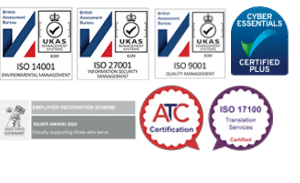Demand on essential services is continuing to rise in the COVID-19 pandemic. During these times, it’s important not to underestimate the services that support the NHS and government bodies.
The NHS is currently dealing with an unprecedented number of patients. However, not all patients are able to communicate with the NHS as easily as others. Non-English-speaking citizens and those hard of hearing need additional support to allow them to effectively access vital services.
As we can see the most commonly spoken language across the country after English is Polish with 546,000 speakers.
This information only covers the top 10 languages, and the number of non-English speakers currently in the UK is higher. In fact, there is a total of 2,222,000 people in the UK whose main language isn’t English.
All in all, it is clear that there is a definite demand for language services in public services. Such services allow for over 2 million people access the essential services and products they need.
Furthermore, there are 11 million deaf or hard of hearing people currently living in the UK. Supporting these communities is of great importance and even more so in times of crisis. This is especially true considering that Deaf people are more likely to have mental health struggles. In comparison to the general population’s 25%, a reported 50% of hard of hearing and Deaf people face these difficulties.
During times of uncertainty, we must make sure those more vulnerable are supported. Managed language services allow for communication between end-users and professionals to continue unhindered by language barriers.
Remote language services
Before the outbreak of COVID-19, face to face interpreting was the most prevalent form. Even now it continues to be required for certain provisions. However, remote language services have become a go-to alternative for many where there are strict safety guidelines.
DA Languages offers a complete package of remote language services. These include video interpreting, telephone interpreting and translation.
Video interpreting
Video interpreting is an all-encompassing solution. All parties can remotely call and have a professional interpreter facilitate conversation. There is also the added benefit of visual cues and communication. Naturally, this is a perfect solution for those using BSL.
DA Languages offers a video interpreting solution that is both web-based and through our native app. DA Languages’ video interpreting app works across all devices and connects you to an interpreter in under 32 seconds. Video interpreting can be accessed on demand as well as on a pre-booked basis. Reaching a video interpreter is easy, no matter when you become aware you need one.
DA Languages has been working hard to help all our clients move from face to face over to remote services. Naturally, the integration of video interpreting has been the main focus. Video interpreting is the closest alternative to face to face for feeling like the interpreter is right there with you.
Furthermore, we are prepared to offer support for local councils and other organizations wishing to use other online-based platforms. Through programmes such as Skype, Zoom or Microsoft Teams, we can facilitate an interpreter dialing into your video call.
Overall, video interpreting is a key remote language service that allows those in need to still access services as seamlessly as possible.
Telephone interpreting
Telephone interpreting is a fantastic remote services tool. Once again, it allows all parties involved to practise social distancing and remain safe. It is a service that the majority of DA Languages clients were already using. This means that we are more than prepared for the increase in demand.
Alongside DA Languages’ secure and robust conferencing facilities, we also have our own native telephone interpreting app. The app connects clients to linguists in under 20 seconds. The speed of telephone interpreting is a huge benefit. The language service is often used within the emergency services and with it, NHS workers in both emergency and general practice settings can quickly patch an interpreter into a call and understand the needs of the patient as quickly as possible.
Telephone interpreting allows for anonymity to be upheld. Often, this can make a patient or end-user is more comfortable or it may even be legally required.
Like video interpreting, telephone interpreting is available 24/7. Professionals across healthcare services can continue their work without delay and get the best help for a patient, any time of the day or night.
Translation
Although essential service locations remain open, many offices and local councils have closed their buildings for the safety of staff. Therefore, more communication is going through digital formats such as emails, texts, websites and social media.
Translation plays a vital role in allowing information to be sent out quickly whilst still enabling effective communication. Of course, now more than ever, we have to make sure communication is clear and to the point. This is why DA Languages has a dedicated and skilled translation team experienced in translating across all sectors.
From patient communications to informational posters, translation allows a non-English speaking person to understand and access what they need.
Particular with medical terms and industry-specific jargon, languages do not always directly translate. To overcome this, our highly-qualified translation team can bridge the gap between languages when there is no direct translation available. This means the true message and intent of your content is not compromised, even if the English phrasing has no partner translation.
Ultimately, translation ensures non-English-speaking communities across the UK are not deprived of information that could potentially save their lives.
Conclusion
In conclusion, we can clearly see the demand and need for language services during these turbulent times.
The combined non-English-speaking and Deaf communities are over 13 million people in the UK. Each of these has a right to video, telephone and translation services throughout the COVID-19 outbreak and beyond.
Access to vital services such as the NHS should not be subject to criteria. This is why DA Languages is working especially hard to support our essential services to the highest quality. Our efforts allow experts and hard workers to keep this country going and do their job unhindered by language barriers.
If you would like to find out more about how video interpreting, telephone interpreting and translation services can help you and your organisation email enquiries@dalangauges.co.uk or read more on our dedicated services pages.
Finally, stay safe and practise social distancing.




